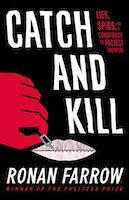Review: Home Before Dark
/3 stars. Hahahahahaha.
Hmmmmmmmm.
Well, then. This is my first Riley Sager, and I have to say - it's kind of what I expected. A twisty, compelling page-turner that is somehow also clumsy, implausible and cheap. I'm such a picky, critical reader, and that for sure prevented me from just sitting back and enjoying the ride. But the fact is that the flaws here far outweigh the merits.
The plot follows Maggie Holt, a young woman who inherits her childhood home when her father passes away. Her father had written a book about the place, a bestselling novel documenting her family's experiences in the so-called "house of horrors," and Maggie is determined to find out 1) why her father wrote such an unbelievable thing exploiting her childhood, and 2) what really happened to inspire him.
A couple of elements that were really distracting:
1. The borrowed premise. Being derivative is FINE - really - but this is straight up copied from Netflix's adaptation of Hill House. I don't mind when authors reference other works, but I do mind when they aren't self-aware about it. The tropes utilized here are just those - tropes - and I found myself wishing for a wink, a smirk, an elbow nudge to let us know that we're all here to lean in and suspend belief together, which brings me to...
2. The implausibility! Oh man. Horror is my favorite genre to read, so I'm no stranger to accepting unrealities for the sake of a reading experience. But this was just too much. Too much inexplicable decision-making (by sane, capable adults?!), too much memory loss, too many tangled secrets, too many convenient twists. Maggie acts like the book ruined her life...? Like every interaction is tainted by it? Would people really CARE that much?! Everything clicks together in the end, which is nice, but it feels kind of like an uhhhhhhh what? moment. Which brings me to...
3. Sloppy writing. Try-hard cliffhangers. Awkward dialogue. Characters who sound exactly like each other. Forced chemistry between other certain characters. Drawn out moments that should've been concise. Rushed moments that should've been drawn out. Unnecessary conflict. REALLY strange character motivations. Easily identifiable red herrings.
I actually feel bad now. It's not THAT bad. It's just a little cringey.
Here's the thing: there's a fantastic idea here. And that idea brings us some great, spooky moments and a perfectly horrifying haunted house atmosphere. The mystery at the heart of the story is truly an interesting one and kept my attention, even though I started piecing things together about halfway through. I didn't hate the protagonist or the format or the way things unfolded. It's also, nicely, a fairly quick read.
I'll pick up another Riley Sager soon. This was good enough for now.
Home Before Dark on: Amazon | Bookshop.org | Goodreads










